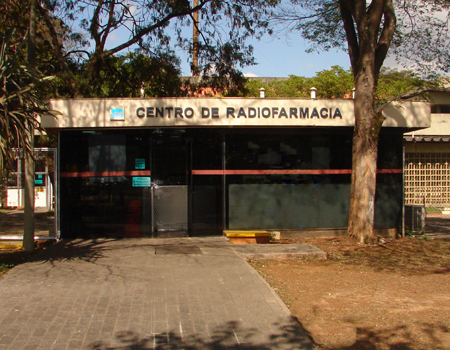Radiopharmacy Center
Warning: This content was machine translated and is scheduled for reviewing.
| Renato Brito | ||
 Façade Façade |
The history of the production of Radiopharmaceuticals in IPEN The ipen, through his former Department of Radioactive Material Processing (TP), current Radiopharmacy Center (CR), was a pioneer institution in the production of radioisotopes and radiopharmaceuticals in Brazil. |
|
Trial production began in 1959 with the radiopharmacology 131I, used for diagnosis and therapy of thyroid diseases, was critical to the viability and consolidation of nuclear medicine in the country.
Subsequently, over the years, substances marked with 51Cr and 131I, for the diagnosis of various functions of the human organism, have been prepared with great acceptance by the brazilian medical class.
With over 20 years of experience in production of radioisotopes in Nuclear reactor, the ipenbegan with the acquisition of a cyclotron Accelerator, model CV-28, 67Ga and 123I, used in diagnosis.
At the end of 1980, nuclear medical consulted the ipen about the possibility of production in the country of the 99generators Mo-99 mTc, hitherto imported because of their increasing use. The ipenestablished a development program and began experimental work with 99Mo imported from Canada. In 1981, started the service to hospitals and clinics in the country with 99generators Mo-99 mTc, prepared with national technology, given an initial demand of 10 generators per week. This demand has grown each year and reached in 2005 the brand of distributed generators 260 per week.
In the following years, other radiopharmaceuticals were being developed, produced and distributed, as the 201Tl chloride, to study the feasibility and the 153Sm, which in the form of153Sm-EDTMP THERAPY, acts as a palliative pain from bone cancer metastases. In 1999 started the production and distribution of Fluordesoxiglicose-18F (FDG-18F) for study of myocardial viability and location of tumors, with great acceptance by the medical profession. The 18F was the first radioisotope produced in the country, for use in PET (Positron Emission Tomography) which allows greater sensitivity in the images obtained and more accurate diagnoses.
At the beginning of the activities of experimental production of radiopharmaceuticals, the raw materials (radioisotopes) were produced in own ipen. With the significant increase in demand and the inadequacy of the capacity of the IEA-R1 Reactor which operated the 2 MW and the existing cyclotron with insufficient power, these inputs were imported almost in its entirety.
From 1995, the ipen began a program of nationalization, with the objective of to produce part of radioisotopes currently imported.
This program promoted the installation of a cyclotron 30 MeV with investments of over $ 6,000,000.
In 1999 the activities of production and distribution of radioactive products of CR, obtained the ISO 9002 certification recommendation through a program of quality of ipen. In 2002, continuing the program, the CR has been certified by ISO 9001 for the scope of research and development, production, quality control and marketing of radioisotopes. In 2005 the COR achieved re-certification in the same standard.
In 2005 the COR produced 100% of annual domestic need of 67Ga and 201Tl and 60% of 131i. This nationalization program responded on 2005 for a substantial savings on the total imports of the year from the equivalent of $ 1,600 .000.
The nationalization program, associated with the development of new products, has propitiated the ipen produce and distribute nationwide, several radioactive diagnostic products and treatments, among them, primary radioisotopes, and lyophilized reagents marked molecules for prompt appointment with 99 mTc. Such radiopharmaceuticals are produced with quality controlled for Administration in humans in the form of injectable drugs, intended for the diagnosis and therapy of numerous pathologies.
For 2012, the Radiofarmácia Center will continue improving its facilities, equipment, human resources and upgrading the technologies involved, to meet the growth of the Brazilian market of radioisotopes and radiopharmaceuticals for diagnosis and therapy, as well as nationalising part of currently imported inputs.


